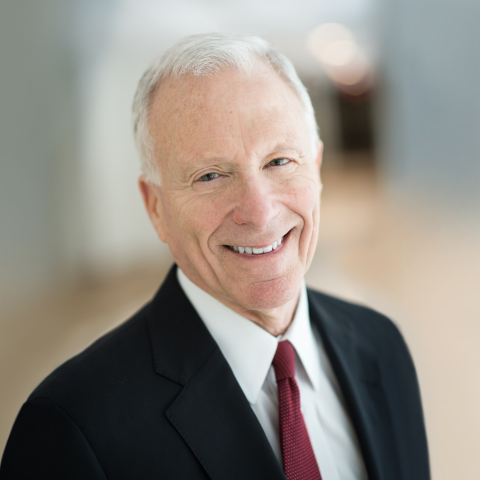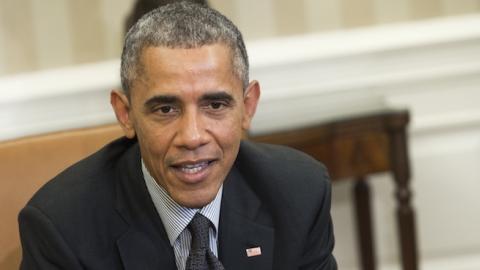A few days ago, President Obama, relaxed in an easy chair, laid out his true strategy to defeat terrorists and the Islamic State. It runs counter to his prior stance. It rejects most national security experts’ advice. Even most Democrats’. But it is clear. Let the debates begin.
How does President Obama propose the Islamic State will be defeated? By letting it rule and fail. “Ultimately,” the President assures Americans, ISIL can’t satisfy people in a “sustained” way.
[U]ltimately these terrorist organizations will be defeated because they don’t have a vision that appeals to people…. ISIL can talk about setting up the new caliphate, but nobody is under any illusions that they can actually in a sustained way feed people or educate people or organize a society that would work.
In short, President Obama envisions dissatisfied citizens eventually defeating ISIL.
But last fall, as ISIS beheaded two U.S. journalists, President Obama depicted a more direct application of external—including U.S. military—forces to defeat ISIS. Indeed, to “dismantle” and “destroy” it. He sent U.S. ground troops to Iraq, and before the UN he said, “The only language understood by killers like this is the language of force. So the United States of America will work with a broad coalition to dismantle this network of death.” Elsewhere he added he would “make sure we have allies on the ground in combination with [our] airstrikes” to accomplish our “clear” objective: “to degrade and destroy ISIS, so that it’s no longer a threat not just to Iraq, but also the region and the United States.” He warned that this isn’t a “one-week, or one-month, or six-month operation,” but, he said, “we’re going to get it done.” As he told the UN, “resolutions must be followed by tangible commitments, so we’re accountable when we fall short.”
Now, it seems, allied strikes along with local forces will not accomplish the military defeat of ISIS, but rather defeat will come from dissention within the Islamic State over its ultimate failures to sustain its economy and its people. This presents a very different means, and likely a very different time frame, for defeating ISIS. In Cold War terms, it is more in the nature of Containment of ISIS, until it “ultimately” rots from within, than of a military plan to defeat it outright.
Until then, there will be a terrorist state in the heart of Arabia. We will not “tolerate terrorist safe havens,” President Obama had told the UN. Iraq, he said, “has created a fertile recruiting ground for terrorists who inevitably export this violence.” Such terrorists, he had noted, have “access to technology that allows small groups to do great harm.” This will persist as Containment runs.
How long does President Obama envision Islamic State rule? How long is “ultimately?” How long can states govern in an “unsustainable” way? Obama does not say, but later in his Fareed Zakaria interview he applies the same terms to explain that authoritarian states—Egypt, Saudi Arabia, and absolute monarchies in the Middle East—will be less and less “sustainable” and will “ultimately” not be effective. “Authoritarians to some degree depend on the ignorance of people,” he asserts, which the “internet and social media” challenge. Yet, surely these states promise to last a long time.
And what of more revolutionary Islamic states like Iran and the Taliban in Afghanistan? Popular discontent toppled neither. Adam Smith once said there is a great deal of ruin in a nation. Early Soviet and Chinese communists showed that enough killing can keep thugs in power despite disastrous economic policies.
Surely the Islamic State matches thuggery of yore. It controls some oil, and may garner anti-Shi’a states’ support. Hamas and Hezbollah, not economic powerhouses, survive. Does President Obama know that the Islamic State, once in power, cannot bend its ways to feed people and fill madrassas with legacies of hate? Indeed, ISIS already trains ten-year olds in military/religious zealotry—fresh predators for the cause.
Even while terrorists rule, President Obama said last week, our risks are limited. Terrorist states “can do harm,” he concedes, but we must avoid “overinflating their importance and suggesting…that they are an existential threat to the United States or the world order.”
Yet just weeks ago he told NPR, that, “we can’t underestimate the danger” of the Islamic State, which would
control large swaths of territory, that possess resources and effectively an army that pose great dangers to our allies and can destabilize entire regions that are very dangerous for us.
Early in his term, Obama told Bob Woodward that America “can absorb a terrorist attack…even a 9/11.” But, he conceded that, “A potential game changer would be a nuclear weapon in the hands of terrorists, blowing up a major American city. Or a [biological or chemical] weapon of mass destruction in a major American city…. Because that’s one area where you can’t afford any mistakes.”
Do most Americans, even most Democrats, consider an attack killing 3,000 Americans “overinflated?” What about a steady stream of terror attacks from home grown terrorists, about which U.S. and British intelligence recently warned, and the French in a smaller way experienced. What about the tens of thousands or more that biological weapons could kill, according to multiple bipartisan studies?
Americans know that a terrorist team of the size that launched 9/11 could also, with other weapons, kill many more, as President Obama acknowledged at the UN. How might such attacks affect civil liberties? What harm does President Obama consider “existential”?
Recent hearings before the Senate Armed Services Committee and statements from current and former officials underscore such concerns. The Islamic State, one noted, has no trouble filling its ranks. It’s spreading. Another testified that former Iraqi Ba’ath fight alongside the Islamic State, which would surely be eager to tap any knowledge of Iraq’s once-active biowarfare program. Hardened terrorists may soon return here.
Respected former Secretaries of State Henry Kissinger and George Shultz testified that Islamist extremists, a region out of control, and the threat of WMD proliferation endanger Americans and challenge world order. As Shultz and Kissinger noted, these are not new problems. They don’t arise in isolation; they can’t be addressed ad hoc.
President Obama worries rightly about wasting U.S. resources in futile wars, but these elder statesman worry, too, about the long-term costs of letting a dangerous region quite literally go to hell.
Shultz reminded Senators of his 1984 warning that “Terrorism is a contagious disease that will inevitably spread if it goes untreated,” and that the magnitude of this threat “is so great that we cannot afford to confront it with half-hearted and poorly organized measures.”
Back in 1958, then-Professor Henry Kissinger warned Americans that, in the modern era, oceans will not insulate us from hostile aggression in critical regions. “American strategy has to face the fact that it may be confronted with war, and that if…we are unwilling to resist, it will mean the end of our freedom.”
Americans’ willingness to take up this fight, Kissinger added, “will depend to some extent on their leadership.”
We need the debate now.




















